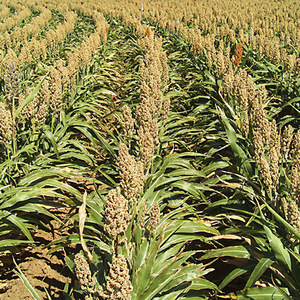EPA proposes distillers sorghum oil as advanced biofuel feedstock

Photo: USDA ARS
January 5, 2018
BY Erin Voegele
The U.S. EPA has released a notice of proposed rulemaking related to fuel pathways using distillers sorghum oil as feedstock for biofuel production. A 30-day comment period on the proposal is set to close Jan. 26.
The proposed rule contains the EPA’s analysis of the lifecycle greenhouse gas (GHG) emissions associated with certain biofuels produced using grain sorghum oil extracted at dry mill ethanol plants at any point downstream from sorghum grinding, also known as distillers sorghum oil.
EPA’s assessment concludes that using distillers sorghum oil as feedstock results in no significant agricultural sector GHG emissions. The agency’s analysis determined that biodiesel and heating oil produced from distillers sorghum oil via a transesterification process, and renewable jet fuel, heating oil, naphtha and liquefied petroleum gas (LGP) produced from distillers sorghum oil via a hydrotreating process, would meet the lifecycle GHG emissions reduction threshold of 50 percent required for advanced biofuels and biomass-based diesel under the Renewable Fuel Standard.
Advertisement
The rule proposes to amend RFS regulations to define the term distillers sorghum oil. It also proposes to add approved pathways to the RFS regulations for biodiesel and heating oil manufactured from distillers sorghum oil using the transesterification process, and for renewable diesel, jet fuel, heating oil, naphtha and LGP produced from distillers sorghum oil via a hydrotreating process.
Additional information is available on the Federal Register website.
Advertisement
Related Stories
The U.S. Department of Energy on May 30 released an updated version of its 45ZCF-GREET modeling tool to account for new feedstocks and methods of production, including ethanol from corn wet-milling and natural gas from coal-mine methane.
Editor's note from the Summer 2025 issue of Biodiesel Magazine
Legislation pending in the Illinois legislature aims to create a clean transportation standard (CTS) that would require a 25% reduction in in the lifecycle carbon intensity (CI) of ground transportation fuels within a 10-year period.
A notice published in the Federal Register by the U.S. EPA indicates that far fewer parties than originally anticipated have registered with the agency as biointermediate producers under the Renewable Fuel Standard.
Biomass Magazine has announced the dates for the 19th annual International Biomass Conference & Expo. The event is scheduled to be held March 31-April 2, 2026, in Nashville, Tennessee, at the Gaylord Opryland Resort & Convention Center.
Upcoming Events










